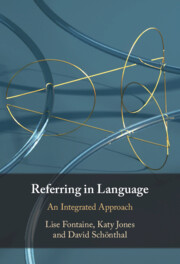
-
Select format
-
- Publisher:
- Cambridge University Press
- Publication date:
- June 2023
- May 2023
- ISBN:
- 9781316534625
- 9781107143470
- 9781316507797
- Dimensions:
- (228 x 152 mm)
- Weight & Pages:
- 0.51kg, 254 Pages
- Dimensions:
- (229 x 152 mm)
- Weight & Pages:
- 0.373kg, 253 Pages
You may already have access via personal or institutional login
Book description
Referential expressions include terms such as determiners, proper names, noun phrases, pronouns, and all other expressions that we use to make reference to things, beings, or events. The first of its kind, this book presents a detailed, integrated account of typical and atypical uses of referential expressions, combining insights from discourse, cognitive, and psycholinguistic literature within a functional model of language. It first establishes a foundation for reference, including an overview of key influences in the study of reference, the debates surrounding (in)definiteness, and a functional description of referring expressions. It then draws on a variety of approaches to provide a comprehensive explanation of atypical uses, including referring in an uncollaborative context, indefinite expressions used for definite reference, reference by and for children, and finally metonymic reference with a special focus on metonymy in medical contexts. Comprehensive in scope, it is essential reading for academic researchers in syntax, discourse analysis, and cognitive linguistics.
Contents
Metrics
Altmetric attention score
Full text views
Full text views help Loading metrics...
Loading metrics...
* Views captured on Cambridge Core between #date#. This data will be updated every 24 hours.
Usage data cannot currently be displayed.
Accessibility standard: Unknown
Why this information is here
This section outlines the accessibility features of this content - including support for screen readers, full keyboard navigation and high-contrast display options. This may not be relevant for you.
Accessibility Information
Accessibility compliance for the PDF of this book is currently unknown and may be updated in the future.


